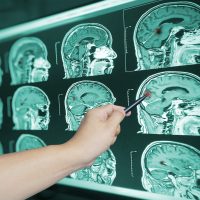What is Traumatic Brain Injury?

Traumatic brain injury (TBI) is often discussed in connection with car crashes, slip and fall accidents and other personal injury matters. TBIs commonly result from traffic accidents and other accidents or trauma, but what actually is a TBI? How are they connected to concussions, comas, and other ailments? Read on to learn about traumatic brain injuries and the risks they carry, and call a dedicated Beaumont traumatic brain injury lawyer after an accident for help seeking monetary relief.
Defining Traumatic Brain Injury
A traumatic brain injury is, unsurprisingly, an injury to the brain caused by trauma. “Trauma” includes trauma, blows or jolts to the head, or situations in which an object perforates into the brain tissue, such as a piece of glass, a knife, or a piece of the skull. The trauma can occur when the head is struck by an object, such as a tool at a construction site, when the head violently strikes something else, or even when the brain slams into the interior of your skull. TBI occurs when such an event causes damage to the brain tissue. The damage may consist of bruising, tearing, bleeding, or other damage. Much like a bruise on your shoulder, symptoms may not immediately manifest or show up.
TBIs range in severity. Mild TBIs are known as concussions. More severe TBIs can lead to long-term pain, disability, and even death. TBIs carry a range of physical and psychological effects. Even with mild TBI, permanent impairment, disability and changed cognitive function can occur. Multiple TBIs (such as sustaining multiple concussions over several months or years) can have a cumulative effect, even if each individual incident would not have been as severe taken alone. TBIs commonly occur in car accidents, slip and fall incidents, defective product accidents, construction accidents, and other incidents caused by another’s negligence.
Symptoms and Risks of Traumatic Brain Injury
TBIs are exceptionally dangerous. Any damage to the brain can have severe, lasting consequences, even with a mild TBI. Moreover, the symptoms of a TBI are primarily internal–only you can tell if you are experiencing tinnitus, blurry vision, or other neurological issues. Someone looking at you may not be able to tell you are suffering a TBI without conducting an MRI or other diagnostic test. TBI symptoms might not even manifest right after an accident. They can take hours or even days to appear, and they can worsen over time.
If you have been in a car crash, a slip and fall, or other incident in which you suffered a blow to the head, see a doctor. At the very least, watch out for the symptoms of TBI, be they mild or severe. A concussion or mild TBI may present with symptoms including:
- Headache
- Nausea
- Fatigue or drowsiness
- Vertigo or dizziness
- Visual or hearing difficulties
- Lightheadedness
- Sensory sensitivity to lights and sounds
- loss of consciousness
- Mood swings, including anxiety and depression
- Trouble sleeping or sleeping more than normal
- Memory difficulties
- Cognitive difficulties
More severe brain injuries can result in extreme side effects and conditions, including the following:
- More serious cognitive difficulties, including confusion and problems focusing or remembering things
- Persistent or severe headache
- Seizures
- Pupil dilation
- Fluid drainage from the nose or ears
- Inability to awaken from sleep
- Weakness or numbness in the extremities
- Slurred speech
- Long-term loss of consciousness and coma
If you identify any of these symptoms after an accident, see a medical professional immediately, and call a personal injury lawyer for advice and assistance.
Call for Experienced Advice and Skilled Representation After a Traumatic Brain Injury in Texas
If you or a loved one has suffered a brain injury in a car crash, slip and fall, defective product accident, or other accident caused by someone else’s negligence, contact the passionate and prepared personal injury attorneys at the Gilbert Adams Law Offices for a free consultation. Call 409-835-3000 or contact us online for immediate assistance.